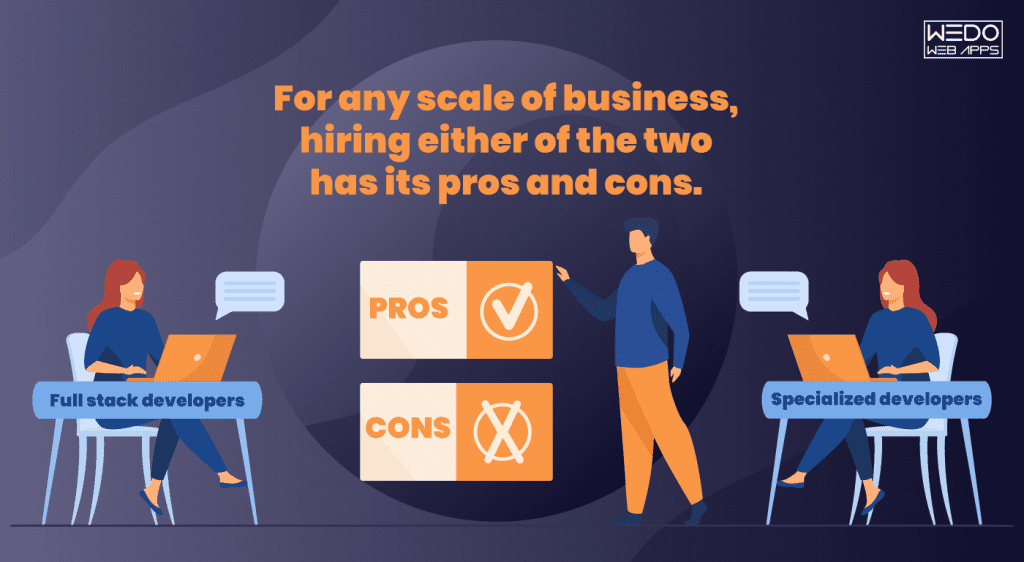31 Aug, 2022 | Mobile App Development
Full stack developers vs specialized developers: Who suits your business best?

The debate between hiring full-stack developers or specialized developers is the most common question asked in the industry. For any scale of business, hiring either of the two has its pros and cons. Both the developers specialize in a unique set of skills which helps in performing various tasks. However, to utilize their skills effectively, the business requirement also plays an important role in deciding which of the two developers need to be hired. Before we delve deeper to find out who’s the right bet and for which business, let’s first understand the difference between a full stack developer and a specialized developer and their skillsets. If you're off the point of view that specialized developers can be easily replaced by a team of full-stack developers, you might want to read on and get another perspective on the matter.
What is a Full-stack developer and a specialized developer?
There are two sides to any application designing- front end and back end development. Front end development includes all the visual aspects of the application or a website with which a user interacts, for eg, the design, colour palette, drop down menus etc. Back end development on the other side is as the name suggests wherein the developer oversees everything which is not visible to the user, for eg, the data, plugins, components etc. A back end developer builds the wireframe which powers the whole application. A full-stack developer specializes in both front end and back end development whereas a specialized developer has the expertise to manage a single domain.
Benefits of a full stack developer
Full-stack developers are multi-skilled in various languages and technologies and are also responsible to implement multiple frameworks, libraries and tools. These all-rounder developers are equipped to handle software testing. Apart from handling both the aspects, front end and back end, a full stack developer also interacts with the client to showcase the project and clear doubts if any. The pay scale of a full stack developer is higher than a specialized developer. Looking at the evolving technology and businesses progressing, full-stack developers are quite in demand.
Since full-stack developers handle every aspect of the application, they prove to be economical if compared to a specialized developer. They are also equipped to fix issues which might crop up in any segment of designing or modification. Full-stack developers act as a one-point contact with the client for managing all the tasks, therefore saving a lot of time and achieving results faster. They are also equipped to carry out the entire task all by themselves since they have such a varied experience.
Drawbacks of a Full Stack Developer
Full-stack developers have an understanding of the overall application from point A to point B however if a given task requires expertise in a particular field, full-stack developers might not have complete knowledge. Moreover, these multi-skilled developers are quite in demand, therefore, have high attrition rates. Being in demand also means that companies who are looking at hiring dedicated developers might face a challenge getting the right resource.
Benefits of a specialized developer
A specialized developer has in-depth knowledge and expertise in one particular domain. Companies hire dedicated resource to oversee a specific task which can vary from domain-related modifications, design, framework tasks, database management etc. Since they specialize in particular fields, they keep themselves updated with the latest upgrades and advances which in turn also equips them to solve issues easily and deliver a superior result. Hiring dedicated developers for particular tasks is easier since there a pool of talent available, unlike full-stack developers.
Drawbacks of a specialized developer
Due to their specialization, developers depend on other team members to complete the tasks which sometimes result in delays. Moreover, the skills for a particular domain come at a certain price for which companies who hire dedicated resource have to pay an additional amount. Companies can hire two to three full stack developers in place of a specialized developer however the latter and their skillset are still relevant to the ongoing trends.
Full-stack developer vs Specialized developer: Whom to choose for your business?
- Having understood the roles and skillsets of the two developers, we now come to the most important question- who is an ideal developer for your business. The answer to the question is not a one-worded answer since the roles and the business requirements also need to be taken into consideration.
- Full-stack developers are equipped to handle the complete project, right from its scratch till its final release. Hiring full-stack developers make sense if it’s a small scale business and the company is working on a low budget.
- Hiring these developers is a cost-effective solution because there are fewer developers which need to be hired and who can manage an array of tasks whereas multiple specialized developers will be needed to complete an array of tasks as per the speciality.
- Developers are ideal if the project is less complicated with clear functionality, easy implementation and doesn’t require detailed knowledge on a particular domain. It will be easier for the developer also to manage the entire task and deliver the project within given timelines.
- Full-stack developers do justice to projects which are running against a tight deadline. With their expertise of starting everything from scratch, full-stack developers are enabled to work within tight deadlines since there is less coordination between teams and the developer is a one-point contact with the client for smoother communication.
Specialized developers, on the other hand, suit large projects which can be divided into smaller projects as per the specialization. Moreover, if the project is complex in nature and is a compilation of several tasks, specialized developers are a perfect choice for the job since they can solve real-time problems easily. Lastly, every project needs to pass the quality parameter for which a specialized developer is ideal since he will be able to dedicate his time and energy into one task only.
Hiring a full stack developer or a specialized developer wholly depends on the requirements of your business. If you have budget constraints and are pushed against a tight deadline, then a full stack developer is the right choice. However, if there is a specific task which needs to be completed and is complex in nature, a specialized developer would be of assistance.
Frequently Asked Questions
A specialized developer is a developer who has a deep level of expertise and experience in a specific area of development, such as front-end development, back-end development, or database management.
A business can ensure the development team has the right mix of skills and expertise by conducting a thorough assessment of the project requirements and identifying the specific areas of development expertise needed, and by hiring developers with complementary skills and backgrounds to create a well-rounded team.
Some emerging trends in full stack and specialized development include the use of artificial intelligence and machine learning, the increasing importance of cybersecurity and data privacy, and the use of agile development methodologies and DevOps practices for improved collaboration and efficiency.
Some best practices for managing a team of full stack and specialized developers include establishing clear roles and responsibilities, providing opportunities for training and development, fostering a culture of collaboration and communication, and regularly assessing and adjusting team composition and development processes as needed.
A business can ensure that their development team stays up-to-date with new technologies and trends by providing opportunities for ongoing training and professional development, encouraging participation in industry events and conferences, and fostering a culture of curiosity and innovation within the development team.

